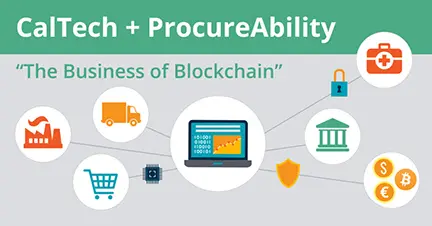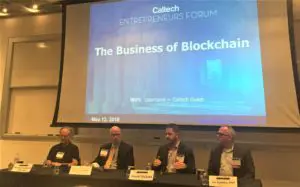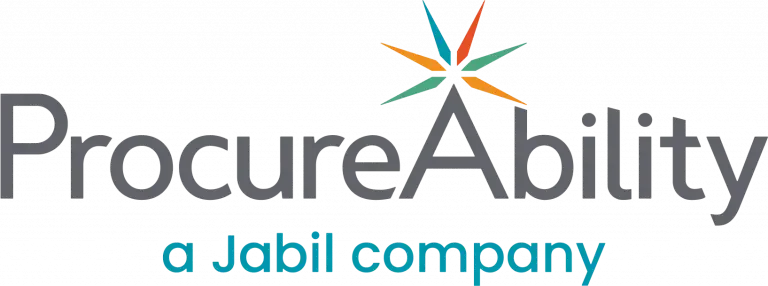
CalTech + ProcureAbility – “The Business of Blockchain”
Blockchain – a digital ledger in which transactions are recorded chronologically and publicly.
David Padula, from ProcureAbility, was recently invited by CalTech to participate in a panel discussion focused on the “Business of Blockchain”. The oversold and standing-room-only event covered a wide range of current and potential applications of the trending technology.
USC Professor and founder of RSA Security, Leonard Adleman (the A in RSA), kicked off the event with an overview of blockchain. The panel then fielded Blockchain questions from moderator Ira Moskatel, an attorney with Arnold Porter, who specializes in technology.
Healthcare and Privacy
The digitization of medical records is a growing industry, often mandated by governments, but the panel agreed that this information should not be stored on a public Blockchain. Private Blockchain solutions exist as well as permissioned access and anonymity with Blockchains like the Hyperledger. Extreme care and caution needs to be taken when it comes to how sensitive personal data could and should be stored on a Blockchain. Additionally, new regulations like the General Data Protection Regulation (GDPR) that the EU has implemented, have much stricter laws that govern data retention and how personal data is shared.
Supply Chain
Some of the largest areas of opportunity can be found throughout a typical supply chain. Trust, as we all know, is usually earned. Historically, it’s challenging for a large number of parties in a supply chain to agree on a common set of data. With Blockchain all the transactions are synchronized and any organization, with permission, can view the data and verify the transactions without unnecessary cross-checking. A recent survey of more than 500 procurement leaders from 39 countries found that the biggest problem they face in the supply chain is transparency. 65% of procurement leaders say they have no or limited visibility beyond their Tier 1 suppliers.
This type of increased supply chain transparency and validation can also lead to the removal of many intermediaries that perform this type of work now. Consider all the fees and time delays that typically accompany delivering and tracking goods. For international ocean freight, customs clearance fees and time delays can result in waste and even spoilage of perishable food. Last year, Walmart ran a very successful proof of concept Blockchain test with one of their largest suppliers of pork in China. The product (bacon!) was successfully tracked from the processing plant, to the warehouse, to an ocean liner, to the port, through customs, onto a delivery truck and ultimately to Walmart’s DC.

Within the procure-to-pay lifecycle there are often large delays in payment processing between supplier invoice submission and payment. Sometimes this is intentional and yields positive cashflow benefits, but oftentimes a company is giving up early payment discounts (free money!). Blockchain can resolve this issue with the use of smart contracts. These contracts are software code that automates “if this, then that” scenarios on a Blockchain. Validation of goods receipts, matching an invoice to a purchase order and then payment automation per the desired payment terms.
Audience questions at the end of the event were plentiful. A very encouraging as a sign of the general interest and growth potential for Blockchain. The market is still young and outside of the financial industry, we’re mainly seeing proof of concept tests performed in other industry verticals. Larger full-scale adoption will be implemented this year by forward-thinking logistics and pharmaceutical providers. In our opinion, fortune will favor the bold early adopters of Blockchain technology.
Interested in learning more from ProcureAbility experts? Click here to visit our whitepaper library.
Subscribe to ProcureAbility Insights to access whitepapers, presentations, plus our latest thought leadership.



